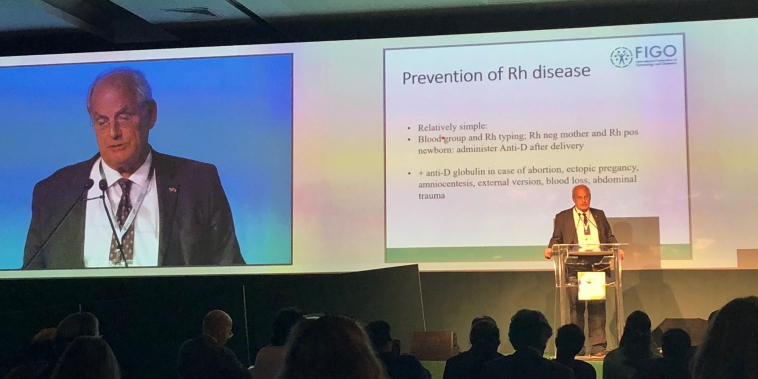Celebrating 50 years of Rh prevention; successes and failures
Today at FIGO World Congress in Rio de Janiero Gerard H.A.Visser and Gian Carlo Di Renzo presented the FIGO position paper: The continuing burden of Rh disease, 50 years after the introduction of anti-D globulin on behalf of FIGO's Safe Motherhood and Newborn Health Committee.

Hemolytic Disease is often fatal for the fetus or newborn and can cause late miscarriage, stillbirth, early post-natal death and life-long disabilities in surviving babies.
Fifty years ago, the discovery of Anti-D Immunoglobulins was a medical breakthrough that resulted in a dramatic reduction in the incidence of HDFN in many parts of the world.
The prenatal protocol with Anti-D Immunoglobulins, introduced in the 1970s in the USA and Western European countries, prescribes screening for all pregnant women and possible administration of treatment. These two steps have led to an almost eradication of HDFN in these countries and in many others. In particular, it has resulted in a dramatic reduction in the number of serious cases that triggered stillbirths or contributed to increased infant mortality and morbidity.
Currently, thanks to Anti-D, cases of HDFN registered annually in more developed countries are rare and Anti-D immunoglobulins are considered the standard of care for preventing Hemolytic Disease in all of North America, Europe and Australia.
Even though it is no longer considered a threat for newborns in many countries, HDFN is still a serious public health problem in vast areas of the world. In countries that do not yet have disease prevention protocols in force, many infants die before or after birth or suffer from brain damage (an estimated 300,000 victims are reported worldwide each year).
Although Anti-D Immunoglobulins are on the World Health Organisation’s List of Essential Medicines, many of the countries where this preventative treatment is most needed lack access to this prophylaxis, do not have appropriately trained medical personnel, or other resources needed to enact the necessary protocols.
We the participants of the XXII FIGO World Congress of Obstetrics and Gynecology held in Rio De Janeiro between 14th and 19th October 2018 acknowledge:
Anti-D Immunoglobulins have nearly eradicated HDFN in the developed world. However, the implementation of protocols for the sustained use of Anti-D has been insufficient in much of the developing world, resulting in some 300,000 infants dying or being severely handicapped annually, 50 years after its introduction.
We believe we can solve this devastating problem through three simple steps:
- Raising public awareness of the risks of the disease
- Routine blood type testing of all pregnant women
- Providing free and unfettered access to Rh Immunuglobulin Prophylaxis
We commit to:
Celebrate Anti-D as a milestone for the health of mothers and babies all over the world, while increasing the international scientific community’s awareness of the problem.
Bridge the existing gaps in access to Anti-D immunoglobulinsbased preventative treatment.
Address is how to meet these challenges and move forward getting protocols for the use of Anti-D accepted and applied in more countries where HDFN remains a real problem.
Improve the awareness of this disease and the treatment therapies available throughout the world and draw attention to the critical issues that still exist.
End